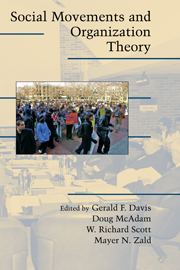Book contents
- Frontmatter
- Contents
- Contributors
- Preface
- I Creating a Common Framework
- II Political and Mobilization Context
- III Social Movement Organizations: Form and Structure
- 7 PERSISTENCE AND CHANGE AMONG NATIONALLY FEDERATED SOCIAL MOVEMENTS
- 8 GLOBALIZATION AND TRANSNATIONAL SOCIAL MOVEMENT ORGANIZATIONS
- IV Movements Penetrating Organizations
- V Conclusion
- References
- Author Index
- Subject Index
8 - GLOBALIZATION AND TRANSNATIONAL SOCIAL MOVEMENT ORGANIZATIONS
Published online by Cambridge University Press: 05 September 2012
- Frontmatter
- Contents
- Contributors
- Preface
- I Creating a Common Framework
- II Political and Mobilization Context
- III Social Movement Organizations: Form and Structure
- 7 PERSISTENCE AND CHANGE AMONG NATIONALLY FEDERATED SOCIAL MOVEMENTS
- 8 GLOBALIZATION AND TRANSNATIONAL SOCIAL MOVEMENT ORGANIZATIONS
- IV Movements Penetrating Organizations
- V Conclusion
- References
- Author Index
- Subject Index
Summary
The transnational integration of markets and political institutions, especially prevalent in recent decades, presents new challenges for organizations of activists seeking to protect their existing rights or entitlements or to advance new claims against power holders. As national markets dissolve into a growing global marketplace, national governments have turned increasingly to international organizations to negotiate new rules about the boundaries of state authority. These interdependent and parallel processes of “globalization” (global market integration) and “internationalization” (the increasing importance of relations between nations) substantially transform the character of the organizational fields in which social movements seek to pursue their interests. This chapter draws from the insights of social movement and organizational scholarship to analyze the changes in the global political economy that are most relevant for social movement actors. It explores whether and how these changes have influenced the character of the population of transnational social movement organizations.
The expansion of the global economy reduces the capacities of states (some more than others) to define and enact their own internal economic policies. It thereby prevents the state from carrying out its traditional functions of regulating the national economy and ensuring the welfare of its citizens. Moreover, the global legal and political environments increasingly constrain the range of policy choices available to national decision makers. As the effective sources of authority in the global polity shift from the national level, groups seeking to challenge existing policies and distributions of power must adapt their strategies and structures to this transformed organizational field.
- Type
- Chapter
- Information
- Social Movements and Organization Theory , pp. 226 - 248Publisher: Cambridge University PressPrint publication year: 2005
- 32
- Cited by



